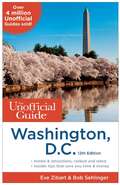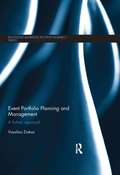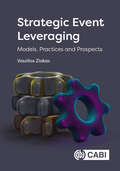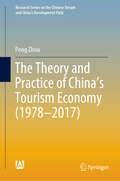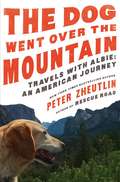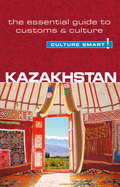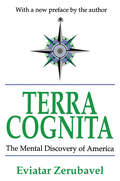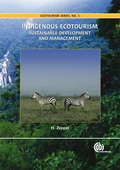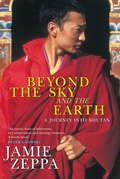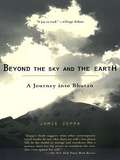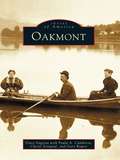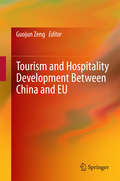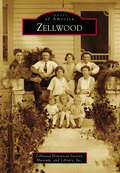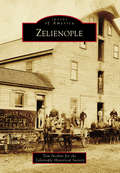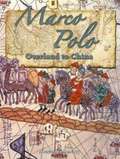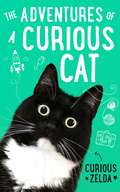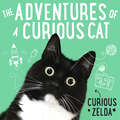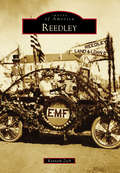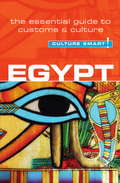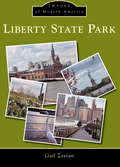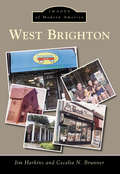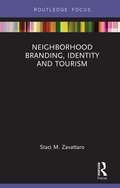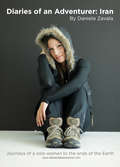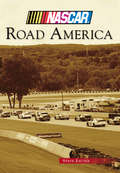- Table View
- List View
The Unofficial Guide to Washington, D.C., 12th Edition
by Eve ZibartCompiled and written by a team of experienced researchers whose work has been cited by such diverse sources as USA Today and Operations Research Forum, The Unofficial Guide to Washington, D.C. digs deeper and offers more than any other guide.<P><P> The Unofficial Guide to Washington, D.C. is the insider's guide to Washington at its best with more than 75 restaurants reviewed and hotels reviewed and ranked for value and quality-plus secrets for getting the lowest rates. With advice that is direct, prescriptive, and detailed, it takes the guesswork out of travel by unambiguously rating and ranking everything from hotels, restaurants, and attractions to rental car companies. With an Unofficial Guide, you know what's available in every category, from the best to the worst and step-by-step detailed plans allow the reader to make the most of their time in Washington, D.C.
Event Portfolio Planning and Management: A Holistic Approach (Routledge Advances in Event Research Series)
by Vassilios ZiakasCities and regions around the world increasingly capitalize on a series of events aimed at optimizing their reach and outcomes. How then can a series of different events be developed and harnessed? What are the conditions and the means by which synergies and collaboration among different events and their stakeholders can be fostered? This book for the first time explores how managers and host communities can synergize sport, cultural and other planned events in a portfolio in order to attain, magnify and sustain their outcomes. The incorporation of different events into a portfolio requires an integrative way of viewing the different community purposes that they serve in unison. This book elaborates on this holistic approach by developing an integrative theoretical framework for conceptualizing event portfolios, and examining their challenges and prospects as well as potential as tools for sustainable development. It therefore presents the foundations of event portfolio planning, the patterns of inter-organizational relationships within collaborative events networks that foster the conditions for community capacity-building and the requirements for the design and development of event portfolios. Topics are considered from varying perspectives and examples of emerging event portfolios from a range of geographical regions are integrated throughout. Uniquely providing a holistic framework for planning and managing a series of events this is essential reading for all those interested in Events Policy, Planning and Management.
Strategic Event Leveraging: Models, Practices and Prospects
by Dr Vassilios ZiakasThis book comprehensively describes, explains, critiques and refines our current perspectives of event leveraging and, in so doing, provides an analytic account of the subject area as a whole, as it concerns the strategic pursuit of attaining and magnifying benefits that derive from events. Encompassing all events including sport, cultural and business, it also covers all kinds of benefits that can be leveraged and lead to sustainability through triple-bottom-line assessment. The book takes an interdisciplinary approach to cross boundaries and creates linkages among the parent disciplines (sport management; events, hospitality and tourism; leisure studies, parks and recreation) and general disciplines (management, marketing, sociology, anthropology, urban and regional planning). Written by an experienced author well-known in the field of event management and leveraging, this book: - Examines the art of event leveraging and contributes to the literature by refining pertinent theory. - Presents and explains theoretical models of event leveraging and emergent derivative frameworks. - Reveals major practices, issues and lessons from literature and case studies. - Integrates disciplinary applications of event leveraging to further refine the theoretical perspective through an interdisciplinary lens. - Develops a comprehensive outlook of event leveraging as a means to sustainability. Building a truly global and transdisciplinary framework, the author provides direction and possibilities that can lead to new forms of leveraging, making this an excellent resource for researchers, practitioners and students interested in event management and policy, sport management, recreation and leisure, and hospitality, tourism and festival management.
The Theory and Practice of China's Tourism Economy (Research Series on the Chinese Dream and China’s Development Path)
by Peng ZhouThis book is devoted to the analysis of the three main tasks of China’s tourism development: Firstly, the theory of tourism development since the initiation of reform and opening-up. Secondly, the practice and problems in infrastructure building. Thirdly, the mold and policy used in the course of development. The book pursues three major objectives: firstly, to portray the stage of development; secondly, to analyze the specific experience in China’s case; thirdly, to review theory and try to put forward advice on investment and management.
The Dog Went Over the Mountain: Travels With Albie: An American Journey
by Peter ZheutlinThe New York Times bestselling author of Rescue Road embarks on a cross-country journey to take the measure of America with a loyal friend. On the cusp of turning 65, a man and his beloved rescue dog of similar vintage take a poignant, often bemusing, and keenly observed journey across America and discover a big-hearted, welcoming country filled with memorable characters, a new-found appreciation for the life they temporarily left behind, and a determination to live more fully in the moment as old age looms. Inspired by John Steinbeck’s Travels with Charley, Zheutlin, hits the road for a 9,000-mile odyssey with Albie to experience all that American is and means today. Similar in approach and tone to Bill Bryson’s best-selling travel classics, but with an endearing canine sidekick, The Dog Went Over the Mountain will delight dog lovers, baby boomers and anyone who seeks to experience life on the open road with a four-legged companion.
Kazakhstan - Culture Smart!
by Dina ZhansagimovaKazakhstan, one of the largest countries on earth, was long hidden from the rest of the world behind the Iron Curtain, and continued to remain unnoticed among the "stans" of Central Asia that gained independence from the Soviet Union in the early 1990s. Now, twenty years later, it has emerged as a modern state with far-reaching ambitions. It has developed rapidly over the last decade, raising a brand-new capital in the middle of its vast, empty grasslands, and stepping up to take the leading position in the region. Blessed with great reserves of oil, gas, and mineral resources, it is politically and economically stable, and the richest country in Central Asia. The seemingly endless expanse of the Kazakh Steppe takes visitors by surprise. In the east and southeast the terrain eventually changes to picturesque highlands and mountains, providing natural habitats for a number of rare animal and bird species. Once home to ancient civilizations, this immense land has yielded a wealth of archaeological artefacts. The modern Kazakh people emerged from the rise and fall of a succession of medieval Turkic states before being absorbed into the Russian Empire. They were pastoral nomads, self-sufficient, free, and famously adaptable. Their openness and generosity of spirit have survived against all the odds of a grim history. Today Kazakhstan is open for business, and receptive again to outside cultural influences. Culture Smart! Kazakhstan introduces Western readers to this complex, unknown people. It guides you through their traditions, customs, and social values. It describes how they behave at work, at home, at leisure, and on the street, and what they eat and drink. There are vital tips on communicating, and invaluable insights into Kazakhstan's dynamic business culture and economy.
Terra Cognita: The Mental Discovery of America
by Eviatar ZerubavelMost of us are fascinated by the conventional storybook account of Christopher Columbus' heroic discovery of America in 1492. Yet, should the credit for discovering America go to a man who insisted it was but a few islands off the shores of China?In Terra Cognita, Eviatar Zerubavel argues that physical encounters are only one part of the complex, multifaceted process of discovery. Such encounters must be complemented by an understanding of the true identity of what is being discovered. The small group of islands claimed by Columbus to have been discovered off the shores of Asia was a far cry from what we now call America. The discovery of the New World was not achieved in a single day but was a slow process--mental as well as physical--that lasted almost three hundred years. By celebrating 1492 as a year of discovery, we inevitably distort the reality of history.In vividly documenting how a slowly emerging New World gradually forced itself into Europe's consciousness, Zerubavel shows that Columbus did not discover America on October 12, 1492. Supplemented by fascinating old maps and a new preface written for this paperback edition, Terra Cognita will be of interest to historians, geographers, cognitive scientists, sociologists, and students of culture.
Indigenous Ecotourism: Sustainable Development and Management
by Heather D. ZeppelDealing with indigenous ecotourism as a special type of nature-based tourism, Indigenous Ecotourism examines the key principles of this field through global case studies and analyzes the key factors for sustainable development.
Beyond the Sky and the Earth
by Jamie ZeppaIn the tradition of Iron and Silk and Touch the Dragon, Jamie Zeppa's memoir of her years in Bhutan is the story of a young woman's self-discovery in a foreign land. It is also the exciting début of a new voice in travel writing.When she left for the Himalayan kingdom of Bhutan in 1988, Zeppa was committing herself to two years of teaching and a daunting new experience. A week on a Caribbean beach had been her only previous trip outside Canada; Bhutan was on the other side of the world, one of the most isolated countries in the world known as the last Shangri-La, where little had changed in centuries and visits by foreigners were restricted. Clinging to her bags full of chocolate, hair conditioner and Immodium, she began the biggest challenge of her life, with no idea she would fall in love with the country and with a Bhutanese man, end up spending nine years in Bhutan, and begin a literary career with her account of this transformative journey.At her first posting in a remote village of eastern Bhutan, she is plunged into an overwhelmingly different culture with squalid Third World conditions and an impossible language. Her house has rats and fleas and she refuses to eat the local food, fearing the rampant deadly infections her overly protective grandfather warned her about. Gradually, however, her fear vanishes. She adjusts, begins to laugh, and is captivated by the pristine mountain scenery and the kind students in her grade 2 class. She also begins to discover for herself the spiritual serenity of Buddhism.A transfer to the government college of Sherubtse, where the housing conditions are comparatively luxurious and the students closer to her own age, gives her a deeper awareness of Bhutan's challenges: the lack of personal privacy, the pressure to conform, and the political tensions. However, her connection to Bhutan intensifies when she falls in love with a student, Tshewang, and finds herself pregnant. After a brief sojourn in Canada to give birth to her son, Pema Dorji, she marries Tshewang and makes Bhutan her home for another four years. Zeppa's personal essay about her culture shock on arriving in Bhutan won the 1996 CBC/Saturday Night literary competition and appeared in the magazine. She flew home to accept the prize, where people encouraged her to pursue her writing. Her letters from Bhutan also featured on CBC's Morningside. The book that grew out of this has been published in Canada and the United States to ecstatic reviews, followed by British, German, Dutch, Italian and Spanish editions. Although cultural differences finally separated Jamie and Tshewang in 1997 while she was writing the book and she returned to Canada, she will always feel at home in Bhutan. Zeppa shares her compelling insights into this land and culture, but Beyond the Sky and the Earth is more than a travel book. With rich, spellbinding prose and bright humour, it describes a personal journey in which Zeppa acquires a deeper understanding of what it means to leave one's home behind, and undergoes a spiritual transformation.From the Trade Paperback edition.
Beyond the Sky and the Earth
by Jamie ZeppaIn the tradition of Iron and Silk and Touch the Dragon, Jamie Zeppa’s memoir of her years in Bhutan is the story of a young woman’s self-discovery in a foreign land. It is also the exciting début of a new voice in travel writing. When she left for the Himalayan kingdom of Bhutan in 1988, Zeppa was committing herself to two years of teaching and a daunting new experience. A week on a Caribbean beach had been her only previous trip outside Canada; Bhutan was on the other side of the world, one of the most isolated countries in the world known as the last Shangri-La, where little had changed in centuries and visits by foreigners were restricted. Clinging to her bags full of chocolate, hair conditioner and Immodium, she began the biggest challenge of her life, with no idea she would fall in love with the country and with a Bhutanese man, end up spending nine years in Bhutan, and begin a literary career with her account of this transformative journey. At her first posting in a remote village of eastern Bhutan, she is plunged into an overwhelmingly different culture with squalid Third World conditions and an impossible language. Her house has rats and fleas and she refuses to eat the local food, fearing the rampant deadly infections her overly protective grandfather warned her about. Gradually, however, her fear vanishes. She adjusts, begins to laugh, and is captivated by the pristine mountain scenery and the kind students in her grade 2 class. She also begins to discover for herself the spiritual serenity of Buddhism. A transfer to the government college of Sherubtse, where the housing conditions are comparatively luxurious and the students closer to her own age, gives her a deeper awareness of Bhutan’s challenges: the lack of personal privacy, the pressure to conform, and the political tensions. However, her connection to Bhutan intensifies when she falls in love with a student, Tshewang, and finds herself pregnant. After a brief sojourn in Canada to give birth to her son, Pema Dorji, she marries Tshewang and makes Bhutan her home for another four years. Zeppa’s personal essay about her culture shock on arriving in Bhutan won the 1996 CBC/Saturday Night literary competition and appeared in the magazine. She flew home to accept the prize, where people encouraged her to pursue her writing. Her letters from Bhutan also featured on CBC’s Morningside. The book that grew out of this has been published in Canada and the United States to ecstatic reviews, followed by British, German, Dutch, Italian and Spanish editions. Although cultural differences finally separated Jamie and Tshewang in 1997 while she was writing the book and she returned to Canada, she will always feel at home in Bhutan. Zeppa shares her compelling insights into this land and culture, but Beyond the Sky and the Earth is more than a travel book. With rich, spellbinding prose and bright humour, it describes a personal journey in which Zeppa acquires a deeper understanding of what it means to leave one’s home behind, and undergoes a spiritual transformation.
Oakmont
by Cheryl Zentgraf Gary Rogers Vince Gagetta Paula A. CalabreseLong before the Hulton Bridge, Hulton's Ferry carried locals across the Allegheny River to the road to Pittsburgh and the world beyond. The ferry helped transform a sparsely populated outpost in the early 1800s into a thriving settlement a few decades later and thus earns recognition as the first bookmark in the history of Oakmont. Others followed: the Allegheny Valley Railroad; a lake that covered part of what now is one of the town's busiest streets; Civil War and World War I army encampments; the Willows nightclub and its huge swimming pool; and boat clubs, yacht clubs, and a world-famous country club. Oakmont captures the history of these places and times-along with many others-through nearly two hundred vintage photographs.
Tourism and Hospitality Development Between China and EU
by Guojun ZengTourism and hospitality industry is facing a substantial amount of opportunities and challenges due to the globalization. The Third International Conference on Tourism and Hospitality between China and Spain (ICTCHS) provides a unique global forum for academics, thought leaders and key industry practitioners from diverse backgrounds and interests to meet, discuss and debate critical issues that will affect the future direction of tourism and hospitality research and practice.
Zellwood
by Zellwood Historical Society, Museum, and Library, Inc.Zellwood was named for Thomas Ellwood Zell, who arrived in the area in 1876. Zell sent scrapbooks displaying newspaper clippings to entice Northern friends--former Civil War officers--to settle near Lakes Maggiore and Minore. Word spread that Zellwood was a desirable place to winter and do business. Construction of millionaire steel magnate James Laughlin Jr.'s mansion began in 1885. Zellwood attracted people who built estates and new homes. Boardinghouses popped up. The Holly Arms Hotel and Zellwood Inn housed farmers, teachers, and entrepreneurs. In 1911, a train brought more settlers planning to earn their livelihood from Zellwood's rich earth. Agriculture dominated from the 1940s through the late 1990s. Zellwood was known for sweet corn. By 1999, all but one farm had been purchased for Lake Apopka restoration. Only Long and Scott Farms carries on the tradition of growing Zellwood sweet corn by farming the sandy soil bordering the muck lands of Lake Apopka.
Zelienople
by Zelienople Historical Society Tom NesbittIn 1800, Butler County had just been created and was nothing but forest, streams, and Indian trails. Dettmar Basse purchased 10,000 acres in this wilderness, where he hoped to create a barony similar to the ones he had known in Germany. In 1802, he started to build his Bassenheim (Basse's home). It took seven years and $7,000 to build this castle, and he also laid out streets for a town that he named for his daughter Zelie (nople means village). Zelie and her new husband, Philippe Passavant, of French ancestry, traveled here in 1807 and became the first merchants on Main Street. Their son William A. Passavant founded numerous orphanages and hospitals throughout the country. Christian Buhl, the hatter and furrier, came to Zelienople from Germany in 1802. His grandson Henry Buhl Jr. founded Boggs and Buhl Department Store on the north side of Pittsburgh. In 1927, he bequeathed an $11-million endowment to the Buhl Foundation, making it one of the best-funded foundations in the country.
In the Footsteps of Explorers: Marco Polo Overland to China
by Alexander ZelenyjMarco Polo was an Italian explorer who travelled to Asia, where he served in the court of China's great Mongol emperor Kublai Khan. By writing a book of his discoveries and adventures, Marco offered Europe its first look at eastern cultures and traditions.
The Adventures of a Curious Cat: wit and wisdom from Curious Zelda, purrfect for cats and their humans
by Curious Zelda'A purrfect gift for a loved one with a special affinity for the feline' 'An absolute must for any cat lover''Curiosity is more than a desire to discover. It's a lifestyle, and a purrvilege. It's hours of observing a fly on the wall. It's entering the sock drawer just before it closes. It's sniffing the lampshade one more time . . .'Such is the wisdom of Curious Zelda: social media star, agony aunt, yoga teacher, cat. In The Adventures of a Curious Cat she gives insight into her view of the world and dispenses unparalleled wisdom. Zelda explains, in her unique voice, how to handle humans, how to communicate with furniture, and most importantly how to live a life curiously. It's the ultimate self-help guide for any cat, or indeed, their human.
The Adventures of a Curious Cat: wit and wisdom from Curious Zelda, purrfect for cats and their humans
by Curious Zelda'A purrfect gift for a loved one with a special affinity for the feline''An absolute must for any cat lover''Curiosity is more than a desire to discover. It's a lifestyle, and a purrvilege. It's hours of observing a fly on the wall. It's entering the sock drawer just before it closes. It's sniffing the lampshade one more time . . .'Such is the wisdom of Curious Zelda: social media star, agony aunt, yoga teacher, cat. In The Adventures of a Curious Catshe gives insight into her view of the world and dispenses unparalleled wisdom. Zelda explains, in her unique voice, how to handle humans, how to communicate with furniture, and most importantly how to live a life curiously. It's the ultimate self-help guide for any cat, or indeed, their human.
The Adventures of a Curious Cat: wit and wisdom from Curious Zelda, purrfect for cats and their humans
by Curious Zelda'Curiosity is more than a desire to discover. It's a lifestyle, and a purrvilege. It's hours of observing a fly on the wall. It's entering the sock drawer just before it closes. It's sniffing the lampshade one more time . . .'Such is the wisdom of Curious Zelda: social media star, agony aunt, yoga teacher, cat. In The Adventures of a Curious Cat she gives insight into her view of the world and dispenses unparalleled wisdom. Zelda explains, in her unique voice, how to handle humans, how to communicate with furniture, and most importantly how to live a life curiously. It's the ultimate self-help guide for any cat, or indeed, their human.
Reedley
by Kenneth ZechIt was in 1888, four short years after he first came to Fresno County to farm wheat, that Thomas Law Reed made a deal with the Southern Pacific Railroad. In exchange for a half-interest in 360 acres of Reed's farmland, the railroad would build a depot along its east side branch and help develop a townsite. The town was Reedley. See what happened when settlers arrived. Watch as homes are built, as businesses are started, and as schools and churches are founded. Witness farmers cultivate the region's rich soil, and with irrigation, grow a bounty of crops that they will ship near and far. View a place of dusty streets and simple wooden buildings transformed into a modern 20th-century community. Meet the people of Reedley as they work, learn, worship, and celebrate. This book is Reedley's family photo album.
Egypt: Culture Smart!
by Jailan ZayanThe best-selling Culture Smart! series continues where other guides leave off. Whether you are travelling on business or pleasure, long-term or short, Culture Smart! is your pocket-sized cultural roadmap that never goes out of date. Providing essential information on attitudes, beliefs and behaviour in different countries, these concise guides enable you to steer clear of embarrassing mistakes, feel confident in unfamiliar situations, and arrive at your destination with local knowledge on what to expect and how to behave. Culture Smart! has become as essential as remembering to pack your passport. Be a responsible traveller with Culture Smart!, the smarter way to travel.
Liberty State Park (Images of Modern America)
by Gail ZavianSituated on the Hudson River, the Central Railroad of New Jersey terminal operated its railroad/maritime complex for over 100 years in this area. After its shutdown in 1967, community advocates, already lobbying for nine years, continued their successful campaign for the site to become a public park. With over 1,000 acres, Liberty State Park opened on Flag Day--June 14, 1976. Today, this recreational landscape features the Nature Interpretive Center, Liberty Science Center, and a section of the Hudson River Waterfront Walkway. Liberty State Park, in Jersey City, is the only place in New Jersey where one can board a ferry to visit Ellis Island and the Statue of Liberty. Liberty State Park showcases the rich cultural and environmental history of this landscape's transformation from an abandoned waterfront transportation hub into one of America's most exceptional state parks.
Liberty State Park (Images of Modern America)
by Gail ZavianSituated on the Hudson River, the Central Railroad of New Jersey terminal operated its railroad/maritime complex for over 100 years in this area. After its shutdown in 1967, community advocates, already lobbying for nine years, continued their successful campaign for the site to become a public park. With over 1,000 acres, Liberty State Park opened on Flag Day--June 14, 1976. Today, this recreational landscape features the Nature Interpretive Center, Liberty Science Center, and a section of the Hudson River Waterfront Walkway. Liberty State Park, in Jersey City, is the only place in New Jersey where one can board a ferry to visit Ellis Island and the Statue of Liberty. Liberty State Park showcases the rich cultural and environmental history of this landscape's transformation from an abandoned waterfront transportation hub into one of America's most exceptional state parks.
Neighborhood Branding, Identity and Tourism (Routledge Focus in Tourism)
by Staci M. ZavattaroThis book delves into neighborhood branding by looking at the City of Orlando and the identities that set each neighborhood apart from others. Orlando is an international tourism capital, known for its abundant theme parks that allow for an escape from reality. The word "Orlando" is almost synonymous with Disney and Mickey Mouse – and for good reason. This place’s brand identity is so strong that outsiders have trouble realizing locals often have a drastically different view of the city. But what else is there? What other brand identities does the place have? The stories from this case study highlight how local stakeholders play a vital role in the success of an overall place brand while also taking steps to maintain their own unique neighborhood vibes. This book will be valuable to academics and students interested in neighborhood branding and shaping identity from the perspective of tourism, geography, and urban studies.
Diaries of an Adventurer: "Journeys of a solo woman to the ends of Earth"
by Daniela ZavalaMixing current events, culture, adventure, history, humor and high doses of adrenaline, "Diaries of an Adventurer" series is a close and authentic look at remote societies and controversial countries around the world. In each travelogue, journalist, and intrepid adventurer Daniela Zavala immerses herself with ceaseless curiosity into exotic cultures and dangerous destinations that can only be comprehended with an open mind, easiness and never-ending inquisitiveness. Since 1997, Daniela has visited solo over 70 countries without fear or prejudice, exploring places that most people wouldn't dare to go or might not even know about. In this edition, Daniela ventures to Iran just a few months after the controversial 2009's presidential election. This land rich in culture has been polemic and feared by the Western world. But, how is the Islamic Republic really like? What's in the mind of the average Iranian? Daniela's experience brings you closer to this fascinating and so-talked about nation.
Road America
by Steve ZautkeLocated one hour north of Milwaukee in Wisconsin's scenic Kettle Moraine, Elkhart Lake's Road America race course is one of the world's most famous permanent road racing tracks. Dating back to 1955, the scenic race course has seen the finest in motorsports, such as NASCAR, open wheel, and sports cars, and the best in amateur racing. The track also hosts year-round activities for corporate outings, go-karting, motorcycle/driving schools, and even paintball.
